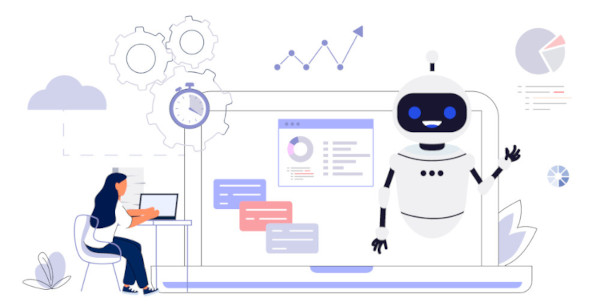
Legacy financial services companies as well as budding start-ups are leveraging the power of cutting-edge technologies to stay ahead of the curve and transform themselves into core Fintech companies. At the center of driving this change and helping Fintech companies become more efficient and productive is robotic process automation or RPA. According to a study done by Mckinsey, RPA in Fintech can play a very definitive role. Research indicates that the implementation of RPA technology can easily cut down costs by 10-25%, and fully automate approximately 42% of finance activities.
In this blog, we have touched upon ways in which RPA is acting as a catalyst to make Fintech companies become more resilient and efficient.
RPA is a form of automation that uses software bots to perform repetitive and time-consuming tasks. These bots mimic human actions, such as copying and pasting data, filling out forms, and running applications. RPA software can work 24/7, with minimal supervision, and can handle a large volume of tasks with high accuracy and speed.
……………………………………………………………………………………………………
Benefits of RPA in Fintech
Improved Productivity: RPA can automate tedious tasks such as data entry, reconciliation, and report generation. These tasks are time-consuming and require a high degree of accuracy. However, by automating these tasks, Fintech companies can reduce costs and improve operational efficiency.
Increased Scalability: Fintech companies with aggressive growth goals need to scale their operations to meet the demand and minimize their system downtime. RPA offers a better scalability solution. Bots can be quickly deployed and configured to handle the increased workloads, making RPA a flexible and adaptable technology.
Improved Compliance: Companies providing financial services operate in a highly regulated environment and are subject to strict compliance requirements. Integrating RPA can ensure that processes are consistent and auditable, thus improving compliance.
Improved Risk Management: Organizations are able to gain better visibility into their operations by using RPA to monitor and evaluate processes. This can help companies identify potential threats, allowing them to take proactive measures to mitigate risks.
……………………………………………………………………………………………………
Use Cases of RPA in Fintech
Customer Onboarding: Customer onboarding is a long and tedious process that involves a number of steps such as collecting, verifying, and processing a large volume of data from customers. This is one of the areas where RPA is particularly effective. Automating this process with RPA can reduce the amount of manual work required and provide an improved customer experience as well as enhanced security.
Customer Service: RPA can automate customer service processes, such as responding to customer queries, balance inquiries, providing information about products and services, etc. By automating these tasks, Fintech companies can reduce costs associated with these processes, freeing up customer service agents to focus on more complex issues.
Mortgage Lending: The process of mortgage lending is very time-consuming; thus, implementing RPA can help speed up the process. It can be used to automatically collect and analyze data, such as credit scores, income statements, employment information, etc., in order to accurately make loan approval decisions. This can help reduce the time taken for loan approvals, eliminate tedious manual processes associated with it, and also improve customer satisfaction.
Loan Underwriting: Loan underwriting is an exhaustive process. Here, RPA bots can be used to bring down the turnaround time for this process to 15 mins. They can also be used to automatically assess a borrower’s creditworthiness, evaluate loan documents and applications, identify potential risks associated with a loan, and assist in making decisions.
Automatically Track Transactions: RPA bots can reconcile thousands of transactions in seconds, whereas it may take several hours for a human to do the same task. This reduces the risk of errors and also improves the organization’s efficiency. It can also track the investment of customers and provide them with comprehensive transaction reports on their portfolio to help them maintain full traceability of their investment transactions.
Generate Reports: With the help of RPA technology, Fintech companies can automatically generate reports on customer data with actionable insights and distribute them to relevant stakeholders, such as regulators and investors, without any human intervention.
Anti-Money Laundering: An RPA bot can automatically flag transactions that require further investigation based on predefined rules and thresholds. This ensures that all transactions are reviewed in a timely and consistent manner, which provides greater security to the Fintech platforms.
……………………………………………………………………………………………………
Conclusion
RPA is a game-changer for the Fintech industry. It offers numerous benefits, including cost savings, improved customer experience, increased scalability, and improved compliance and risk management. By adopting custom RPA solutions, Fintech companies can become more resilient, efficient, and competitive in a rapidly changing industry.
Mindfire Solutions can assist in leveraging the power of robotic process automation to drive growth for Fintech companies. Our industry experts can develop tailor-made fintech solutions to create a frictionless digital experience for your customers.
Contact Mindfire Solutions to learn more about how we can help you get the most out of automation.